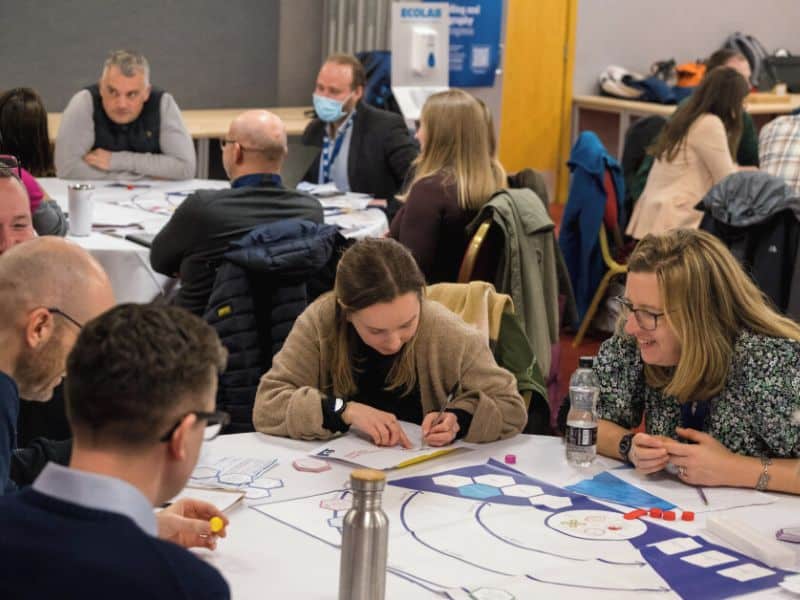Richard Naylor (he/him), IEMA member
Group Sustainable Development Director, Hypnos Beds
This career path has given Richard a thorough understanding of the three pillars of sustainability – society, economy and environment. Under his guidance, Hypnos Beds has won multiple awards for its sustainable solutions.
Richard is an IEMA student member and is currently undertaking a sustainability business specialist apprenticeship at Cranfield University, an IEMA university partner.
Here, he explains what it takes to embed sustainability across an award-winning and royal-warranted manufacturing company, and explains why continuous education is so beneficial in the ever-changing environment and sustainability sector.
I started my career in account management specialising in sales. This also involved product development, which I enjoyed, because it’s a lot easier to sell something you created and are passionate about. That led to my journey into sustainability, because I pitched for the mattress contract at the London 2012 Olympics and won. That contract was key to my career progression because those were the first Olympic Games aligned to The UN Sustainable Development Goals (SDGs), and the products I designed were based on the principles of sustainability from material choices to chemical use and end-of-life recycling credentials, for example.
Hypnos approached me with a new role they had created, which is the role I am in now. The attraction to Hypnos was that it was a family-owned business, which made it very flexible and dynamic from a decision-making perspective. I had worked for a 20bn euro furniture company with an international footprint that provided me with lots of great experiences, but at the same time, it was very difficult to engage with the very top tier of management.
Within the forward-thinking Hypnos family business, I have the autonomy to develop a progressive sustainability strategy that all product development is aligned to. On my first day, the CEO said that he wanted me to transform the business so he could “look myself in the mirror and know I’m doing the right thing.”
From material impact, biodiversity loss, end-of-life circularity, and greenhouse gas footprints, through to social impacts, I am constantly evaluating my understanding of the subject matter and ensuring that I can design, develop and launch force-for-good products that are also commercial and economically viable. My first priority is to make a comfortable bed, but within that, I need to balance the three pillars of sustainability, because that’s what drives value throughout the whole chain, forwards and backwards.
We consistently review how our products impact people, planet and profit. I have a five-year old daughter and she is one of the stakeholders that I consider from a future generation’s perspective when considering product design. This keeps me focused and grounded as I need to continually consider what legacy we are going to leave – I like to say I am saving the world one mattress at a time!
I have won several awards, but I am most proud of winning five Queen’s Awards for Enterprise in both innovation and sustainable development. Outside of awards, I am particularly pleased with developing new supply chains that are not at all normal for a bed company. Within the British wool farming sector, we helped form a collective of 600 farmers who are called ‘The Woolkeepers’.
With our supply chain partners, we’ve developed a third-party assured standard for fair pay, on-time in-full payments, animal welfare, and traceability, and we’re now evolving that to include regenerative farming methodologies. We are assessing pasture rotation techniques to promote healthy soils and root systems, which in turn sequester and store carbon. Our wool production also helps protect and foster biodiversity, which is not what most bed businesses consider when developing new mattresses!
I feel I’m quite knowledgeable within the bed and mattresses sector. However, I wanted to expand my knowledge base outside of what I was comfortable with broadening my skills in sustainability and plugging those knowledge gaps. I am loving every minute of my MSc and apprenticeship journey. The combination of learning and applying skills, knowledge and behaviours in my workplace has been rewarding and commercially advantageous.
I reluctantly admit I am one of the older members of my course cohort, but mixing with a bunch of likeminded change-makers of different ages has been rewarding and fulfilling. The course has been marvellous and the content really does expand your knowledge in an ever-changing sustainability landscape. With greenwashing now becoming a commercial norm, it is so important to be able to promote integrity and credibility through recognised and respected qualifications and professional bodies.

IEMA is the membership body for environment and sustainability professionals